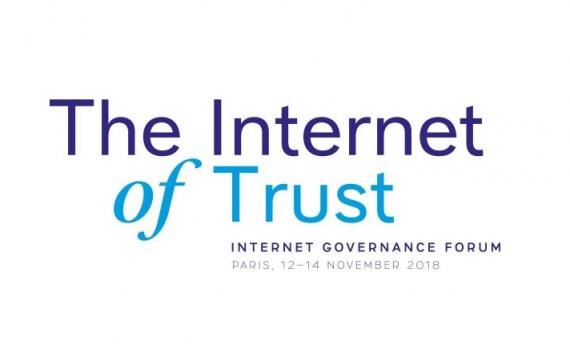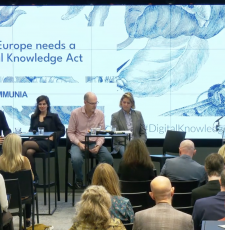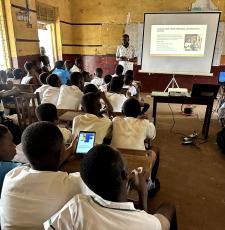
EIFL Public Library Innovation Programme (EIFL-PLIP) Advisor for Initiatives for Africa, Janet Sawaya, shares her takeaways from the 13th Annual Internet Governance Forum (IGF) 2018, in Paris, France (November 12 - 14), which attracted more than 3,000 participants from 143 countries. This year’s IGF theme was the Internet of Trust.
During the opening ceremony of IGF 2018, António Guterres, Secretary‑General of the United Nations called on delegates to move the IGF digital dialogue beyond the “usual suspects”, and to hear diverse voices - local communities; people with disabilities; women (who have been underrepresented in both design and use of digital technology), and governments of developing countries.
"How do we support a culture and education system that encourages lifelong learning? Do not forget that more than half the world's population still does not have meaningful access to the internet. How can the IGF help to bridge this digital divide both between and within countries?" Guterres asked.
For me, these questions drew attention to public libraries, and throughout the IGF, as in past years, public libraries were referenced as places were people can get online.
THE CASE FOR PUBLIC LIBRARIES
On behalf of the Dynamic Coalition on Public Access in Libraries (DC-PAL), I made the case to the Dynamic Coalition (DC) main session of the IGF - that connecting public libraries is a relatively low-cost, high-impact means of bringing the benefits of connectivity to communities. Libraries pre-exist, are known and trusted spaces in communities, and are already included in government information programmes and supported by the investment of Universal Service Funds and broader government budgets.
Librarians’ existing mission is to help people access the information they need, and through broad knowledge of online resources, beyond simple searches, librarians help the public to expand their ability to find relevant information and build their digital skills.
Adequately supported libraries, with strong internet connections and skills, deliver services that contribute to delivery of the Sustainable Development goals (SDGs). For example, they are providing digital skills training for marginalized communities - including specific skills like robotics, and web-design (SDG4); they provide equal spaces where women can use and learn to use technology (SDG5). There are libraries that offer entrepreneurship training and support for job-seekers, helping to eliminate poverty (SDG1). They are supporting farmers by providing information specifically related to agriculture, produce markets and government support and services (SDG2). And there are many examples of libraries improving community health through information services and using technology to connect people to health service providers, like doctors (SDG3).
We also contributed to IGF Policy Options for Connecting and Enabling the Next Billion(s). Before the meeting in Paris a call asking for concrete stories to showcase how connecting people to the internet helps achieve broader Sustainable Development Goals was shared. We responded with stories about how public access through libraries is addressing SDG 7 – Ensure access to affordable, reliable, sustainable and modern energy for all; SDG 8 - Decent Work and Economic Growth; SDG 9 - Industry, Innovation and Infrastructure and SDG 17 - Partnerships for the Goals.
TECHNICAL, LEGAL AND FINANCIAL ASPECTS OF PUBLIC ACCESS
EIFL together with IFLA organized the session of the DC-PAL, in which representatives of library organizations and NGOs heard presentations by invited experts from Gigabit Libraries Network, Access Now, Pangea, guifi.net and the National Parliamentary Library of Georgia on technical, legal and regulatory and financial aspects of extending internet access to communities through public libraries.
Discussing technical issues, Don Means from Gigabit Libraries Network described how public libraries could take the lead in expanding internet access by combine wired and wireless internet to create internet hotspots in different places in cities and communities, for example, in public parks or centres for seniors. Peter Micek from Access Now spoke about how important it is for organizations (like libraries) that provide public internet access to inform people about laws and regulations affecting their rights to information, as well as to protection of personal data and privacy. Leandro Navarro from Pangea suggested innovative funding models for public internet access, for example, the creation of social impact funds for organizations providing free access to the internet, or reduction of costs by sharing infrastructure with other organizations.
Contributions from the experts and the IGF audience will feed into a guide that IFLA and the DC-PAL partners are producing to that will deepen libraries’ understanding of the different policy, technical, legal and financial issues affecting public internet access.
IGF 2018 was exciting. It was good to see public libraries asserting their role in connecting people, building digital skills and contributing to the SDGs at this IGF. Libraries’ are a steadily growing voice - and I look forward to IGF 2019.
FIND OUT MORE
- Read the transcript of the DC-PAL session at IGF 2018.
- About the Dynamic Coalition on Public Access in Libraries.
- About the Internet Governance Forum (IGF).
SHARE / PRINT









